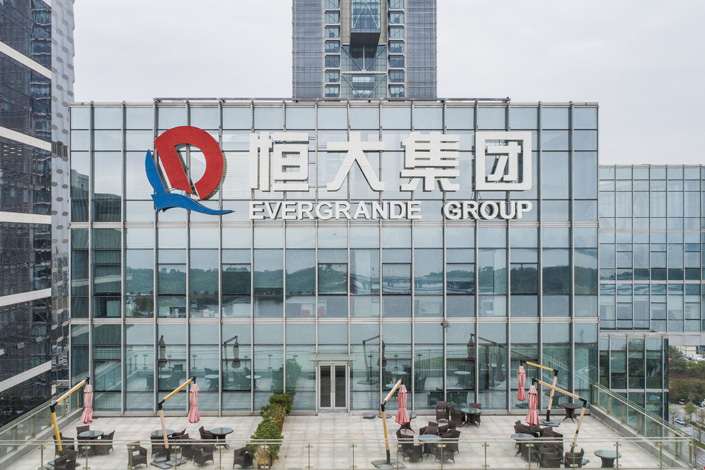
After months of spiraling concerns and speculation over its debt, one of China’s largest property developers Evergrande formally announced on Dec. 3 that it had received a notice to honor an offshore guarantee obligation of $260 million. The company stated that the group will proactively evaluate its financial obligations with its advisors, and that it will “communicate with offshore creditors” to restructure offshore debt.
Meanwhile, the Guangdong government (where Evergrande is based) announced that it would be sending a team to Hengda Real Estate, the real estate arm of Evergrande, “at the company’s request”, to help “supervise corporate internal control”, “supervise risk disposal”, and maintain “normal operation”. It seems that at least one long-standing question surrounding the company has been answered — Evergrande is not “too big to fail” and it must meet its debt obligations.
What does this mean?
It may take quite some time before we know how Evergrande will be restructured, but it seems the process has finally begun. As we had expected, the government’s priority seems to be ensuring property project delivery and protecting home buyers, as evidenced by the Guangdong government’s action to try to coordinate a debt restructuring effort to “protect interests of all parties”, which include suppliers, construction companies, creditors and home buyers, and ensure “social stability”.
To limit the spillover effect of the Evergrande default on the property sector more broadly, the People’s Bank of China, the China Banking and Insurance Regulatory Commission and China Securities Regulatory Commission have been quick to assure the market that (i) Evergrande defaulting on offshore debt is an “individual phenomenon” in the market, (ii) debt problems at Evergrande should not affect the “normal operation” of China’s banking and insurance sectors, (iii) banks are “actively involved” in ensuring construction resumption, property delivery, and provide credit to satisfy mortgage and “reasonable” developer demand, while the capital market will support “reasonable and normal” financing need of developers, and (iv) the government desires “stable and healthy development” of the property sector.
Implications for the property sector
Friday’s announcement will likely lead to negative market reactions amid increased worries about other property developers following suit. As we have written earlier, Evergrande’s debt problem has aggravated challenges in the property sector already weighed down by weakening fundamentals and policy tightening. Developers’ offshore financing channels have been effectively closed and cash flows drained by falling sales and freezing pre-sales proceeds, although regulators have told banks to ease mortgage lending and developer loans somewhat recently.
A recent UBS Evidence Lab housing survey showed that home purchase intentions have fallen significantly. We expect property sales and starts to fall by 20% or more in the remainder of 2021, and 25-30% YoY in Q1 2022 (due to the high base) as the current property downturn continues. In this downturn, it would not be a big surprise if more defaults were to occur in the coming months.
We still expect systemic risk to be contained
The property sector matters enormously for China’s macro economy and financial stability, and as we wrote earlier this week, without policy easing, property sales and starts could fall 20% in 2022, which would likely cause a hard landing.
However, we believe the government will remain pragmatic and will ease property policies over the coming months. In fact, signs of mortgage and lending easing have emerged. We think additional measures could include further easing of mortgage and developer financing, relaxation of capital market financing, adjustment in land policy, and increasing of rental constructions.
We also expect both fiscal and monetary policies to be eased (including a RRR cut this month) and infrastructure investment to increase. We believe these measures can help stabilize property activities from Q2 2022 onwards, with 2022 sales and starts dropping by about 10-12% and property investment declining by 5%.
We also expect the government to contain risks to the financial system by ring-fencing banks most exposed to troubled developers, increasing liquidity offering to banks, and using regulatory forbearance to allow for gradual restructuring of bad debt. The UBS bank team estimates that the direct impact of property debt defaults is manageable.
What should investors look out for?
Premier Li Keqiang told the visiting IMF delegation in Beijing on Dec. 3 that the government would “cut RRR at appropriate time(s)”, which we expect to be this month. With the property downturn deepening, investors should watch for clearer signals from the upcoming Central Economic Work Conference for additional policy easing.
Other policy windows include mid-January before the Chinese New Year, when various government agencies discuss their annual work plan and when the central bank may provide additional liquidity to the market. In early March, the National People’s Congress meeting will announce the budget and other 2022 economic policies.
Wang Tao is the head of Asia economics and chief China economist at UBS Investment Bank.
The views and opinions expressed in this opinion section are those of the authors and do not necessarily reflect the editorial positions of Caixin Media.
If you would like to write an opinion for Caixin Global, please send your ideas or finished opinions to our email: opinionen@caixin.com
Get our weekly free Must-Read newsletter.







